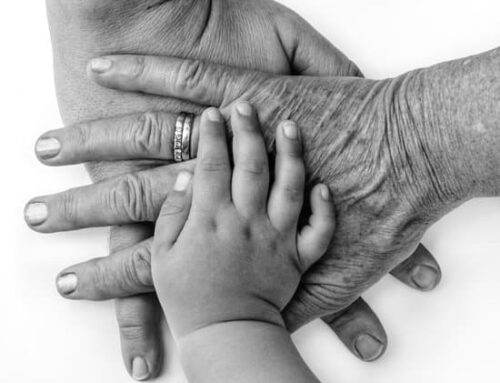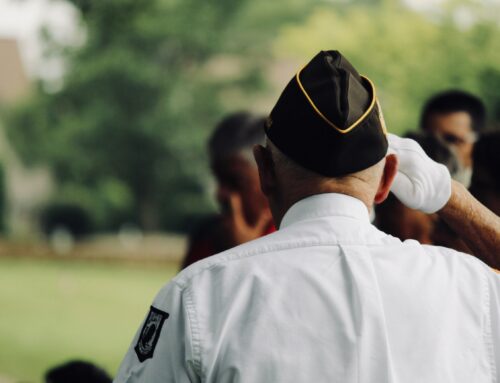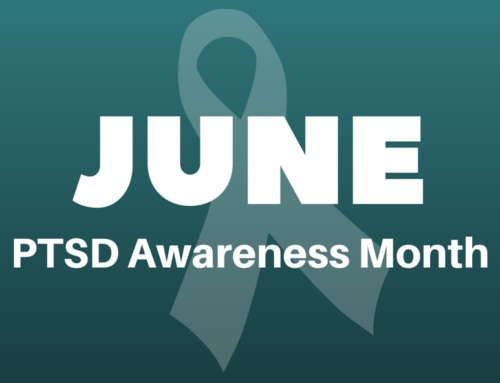By Liz Merrill, LCSW-C
August 7th is Purple Heart Day, a time to honor servicemen and women who have been wounded or killed during acts of bravery in military combat. These men and women have sacrificed their safety and wellbeing; and in many cases, their lives, to protect our country. As we set aside this day to acknowledge and reflect on their service, it brings to mind the gravity of their sacrifice and the significant impact it has on them and their families.
Servicemen and women who return home with physical injuries can have many difficult medical challenges to overcome, but current statistics show that there are higher numbers of service members who struggle with the emotional effects of combat. The Wounded Warrior Project (WWP) website reports that 52,000 servicemen and women have sustained physical injuries in recent military conflicts, but 500,000 live with depression and Post-Traumatic Stress Disorder. https://www.woundedwarriorproject.org/general-wwp-faqs
These “invisible wounds” can have a significant impact on daily functioning, but many people do not recognize the common symptoms of these disorders.
Depression is more than just feeling down or “blue” for a few days; if a person experiences 6 or more of the following symptoms within a consecutive 2-week period, they could be clinically depressed.
Depression symptoms include:
- Persistent sadness, frequent crying
- Loss of energy
- Increased or decreased appetite
- Disrupted sleep (difficulty falling/staying asleep or sleeping excessive amounts)
- Loss of interest in previously enjoyed activities
- Isolation/withdrawal
- Irritability
- Feelings of excessive and inappropriate guilt
- Feeling restless/fidgety
- Feeling slowed down in movement and/or speech
- Somatic complaints are also common, such as:
- Headache
- Stomachache
- Back or neck pain
- Digestive discomforts, such as chronic constipation or diarrhea
- Suicidal thoughts can go along with depression, so it’s particularly important to recognize these warning signs:
- Feeling helpless and/or hopeless
- Is withdrawn and isolative
- Persistent thoughts of death
- Specific plans for inflicting self-harm
- Giving away belongings or talking about not being around in the future
If any of these symptoms are present, the best means of assuring safety is to call 911 or go to your nearest Emergency Room. important to seek treatment right away with a mental health professional who is trained to diagnose and treat the symptoms of depression. If symptoms are severe enough, they may provide a referral to a psychiatrist for a medication consultation.
Post-Traumatic Stress Disorder (PTSD) is a serious mental health condition that can occur as a result of a traumatic experience, such as having a near-death experience, witnessing the death of friends and/or fellow service members; being a victim of sexual assault, or other acts of violence; hearing about traumatic events that have happened to others. The symptoms listed below must have been present for 1 month, cause emotional distress and impair social and employment functioning.
PTSD symptoms include:
- A re-experiencing of the traumatic event in the following ways:
- Persistent/intrusive/unwanted thoughts, memories, images of the traumatic experience
- Flashbacks to the event
- Repeated nightmares about the event
- Emotional distress and physical reactivity when exposed to traumatic reminders (i.e. hearing a car backfire and feeling fear + taking cover)
- Avoidance of trauma-related stimuli, such as:
- Trauma-related thoughts and feelings
- Trauma-related external reminders.
- Patterns of negative thinking and mood after the traumatic experience, such as:
- Overly negative thoughts and assumptions about self and others
- Exaggerated self-blame and guilt
- Lack of interest in previously enjoyed activities
- Withdrawal and isolation
- Negative affect and difficulty experiencing more positive feeling
- Change in arousal and reactivity that began or worsened after trauma, such as:
- Irritability or aggression
- Risky or destructive behavior
- Hypervigilance
- Heightened startle reaction
- Difficulty concentrating
- Difficulty sleeping
Because of the high prevalence of mental health disorders related to traumas experienced by servicemen and women while on deployment, The WWP has become a major source of support for veterans who need assistance with getting help for problems associated with mental and emotional distress. They connect servicemen and women to a network of community providers who specialize in mental health and behavioral disorders like depression and PTSD and who offer high-quality treatment options to veterans at no cost.
WWP has 20 different programs and services that offer a comprehensive approach to help injured veterans fulfill a myriad of personal goals, such as acquiring successful physical rehabilitation, mental and emotional recovery, achievement of their educational and employment goals, maintenance of personal and financial independence; and connection with their families, their communities, and each other. https://www.woundedwarriorproject.org/featured-campaign/911-14-years-later
So, as we approach Purple Heart Day, there are many ways we can express your appreciation for those who have served. The WWP website offers a list of suggestions:
- Call your local VA medical center, and ask about volunteer opportunities.
- Advocate for wounded service members. Call or write your congressional representatives or senators and urge them to make injured service members a legislative priority. Keep your ears open, too, on the WWP Facebook page for advocacy alerts with opportunities to sign petitions, write letters, and more.
- Help raise awareness. Even the simplest efforts can make a difference. Help spread the word about the needs of wounded service members and the work of WWP in your home community. If you know an injured service member who might benefit from WWP’s services, urge them to get involved– it’s free!
- Honor service members. If you know a service member, thank them for their service and sacrifices. These small gestures mean so much!





